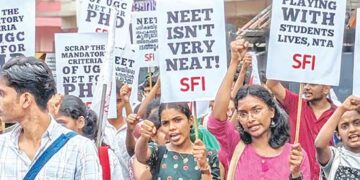 THE credibility of NEET, the National Eligibility cum Entrance Test, undertaken by lakhs of aspiring medicos in the country and recognised globally, has been severely compromised.
THE credibility of NEET, the National Eligibility cum Entrance Test, undertaken by lakhs of aspiring medicos in the country and recognised globally, has been severely compromised.
Despite multiple measures taken by the Centre, a handful of antisocial and treacherous elements have tarnished not just NEET, but also the image of the country. The examination witnessed widespread fraudulent activities. The subsequent investigations and action by the Supreme Court are well known. However, the ability to address the issue remains elusive.
The pressing question is how the youth of the country can retain its trust in the sanctity of the prestigious exam like NEET. Additionally, what perception, trust, and credibility will the world now hold regarding the competence of doctors trained in India?
The Supreme Court’s comment on the issue is telling: “Imagine if a doctor, who takes advantage of system flaws to become qualified, treats you! Such a doctor is not only harmful to you but also to the entire society.”
Zero-tolerance stand
The Government is poised to handle the matter with utmost severity. Notably displeased with NEET organisers, Union Education Minister Dharmendra Pradhan has adopted a zero-tolerance approach. He is determined to evolve a robust and effective strategy to ensure an error-free NEET in the future.
The Congress Party, on the other hand, has latched on to the issue for political gains. Rather than offering any constructive suggestion, and supporting the Government in national interest, it is indulging in blame-game. This political opportunism is being closely watched by foreign diplomats in New Delhi, and they are reporting it back to their countries. No political party, organisation, or social activist is discussing, let alone providing any suggestion on how to ‘purify’ the entire examination process. Whatever legislative or political solution finally emerges, one only hopes the prospects of deserving students are not put in jeopardy.
Serious concern
The NEET (Undergraduate) 2024, conducted on May 5, has been the focal point of controversy, raising serious concern among candidates, parents, and various stakeholders in the education sector. With over 24 lakh students participating across 4,750 centers in 571 cities, including 14 international locations, the exam’s widespread reach has not shielded it from allegations of irregularities and misconduct.
In a startling development, 67 students scored a perfect 720/720, an unprecedented figure that led to suspicions regarding the integrity of the exam. Adding to the controversy, reports emerged that the question paper was leaked prior to the test. It resulted in multiple arrests, particularly in Bihar Further compounding the issue, the National Testing Agency (NTA) awarded compensatory grace marks to 1,563 candidates, who suffered time-loss due to administrative problems at their examination centers. This selective awarding of marks has been criticised by many students, exacerbating the feeling of inequity.
















